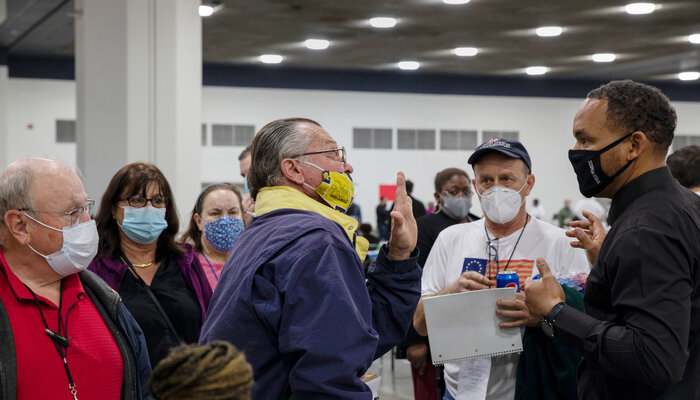Election officials are the heroes who keep our democracy going no matter what — through the Civil War, natural disasters, and most recently, a pandemic.
Yet, in our recent poll of local election officials, one in six reported that they have experienced threats because of their job, with 77 percent saying they feel these threats have increased in recent years. Over half reported that they are concerned about the safety of their colleagues, and more than one in four are concerned about being assaulted on the job.
Given those numbers, it is unsurprising that 30 percent of these officials knew of one or more election workers who have left their jobs at least in part because of fear for their safety, increased threats, or intimidation. Most are concerned about retaining and recruiting election workers in the future.
The election officials we surveyed were in strong agreement about one thing: The federal government is not adequately addressing the problem. Nearly 80 percent of election officials think the federal government is either doing nothing to support them or taking some steps but not doing enough.
While the Justice Department’s task force to address the issue of threats can provide after-the-fact criminal accountability, election workers also need proactive steps that will help keep them and their families safe now. Here are some of the ways Congress can act.
- Congress should authorize grants that can be used for physical safety training, including prevention and de-escalation training. These grants could pay for online privacy companies that ask data brokers to remove individuals’ personal information like cellphone numbers from the internet. The grants could also be used to improve the security of election officials’ homes with items such as doorbell cameras and home security system subscriptions.
- Congress should capitalize on the strengthened relationship that the Cybersecurity and Infrastructure Security Agency (CISA) has built with local election officials since 2018 by authorizing funding for CISA to develop and conduct online safety training. Training could cover how election workers can avoid revealing their and their families’ location. These methods include turning off location tags in social media postings, asking websites to remove personal information, and avoiding postings that might inadvertently reveal locations of schools and homes.
- Federal law already prohibits threats carried out through the mail or other forms of interstate communications, but our survey found that of those election officials who have been personally threatened or harassed, over half have been subject to this behavior in person. Federal law also prohibits intimidation of voters in a federal election, as well as those who are assisting them in exercising their rights, but it should make clear that it is a crime to intimidate election workers who are carrying out the vote tabulation process, statutory audit or recount procedures, reconciling vote data, or vote certification. The rights of election observers can be respected without tolerating conduct that places another person in reasonable fear for their safety or the safety of others.
- Many election workers have reported feeling unsafe in their own homes due to threats, harassment, and doxing. Congress should prohibit revealing the personally identifying information of election workers and election vendors with the intent to threaten or intimidate them.
- Many states have address confidentiality programs that protect the home addresses of survivors of domestic violence or stalking. Congress could provide grant funds to all states that maintain such programs and permit election workers to enroll.
Election workers deserve better than threats against them for doing their job. Congress should do its part to protect the workers who protect our elections.






